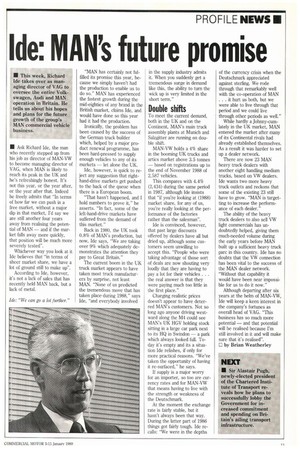Ide: MAN'S future promise
Page 15

If you've noticed an error in this article please click here to report it so we can fix it.
11 Ask Richard Ide, the man who recently stepped up from his job as director of MAN-VW to become managing director of VAG, when MAN is likely to reach its peak in the UK and he's refreshingly honest. It's not this year, or the year after, or the year after that. Indeed he freely admits that "In terms of how far we can push in a free market, without a major dip in that market, I'd say we are still another four years away from realising the potential of MAN — and if the market falls away more quickly, that position will be much more severely tested".
Whichever way you look at it Ide believes that "in terms of sheer market share, we have a lot of ground still to make up".
According to Ide, however, it's not a lack of sales that has recently held MAN back, but a lack of metal. "MAN has certainly not fulfilled its promise this year, because we simply haven't had the production to enable us to do so." MAN has experienced the fastest growth during the mid-eighties of any brand in the British market, claims Ide, and would have done so this year had it had the production.
Ironically, the problem has been caused by the success of the German truck builder which, helped by a major product renewal programme, has been hard-pressed to supply enough vehicles to any of its markets — let alone the UK.
Ide, however, is quick to reject any suggestion that righthand-drive markets get pushed to the back of the queue when there is a European boom.
"That hasn't happened, and I hold numbers to prove it," he asserts. "In fact, some of the left-hand-drive markets have suffered from the demand of this market."
Back in 1980, the UK took 0.8% of MAN's production, but now, !de says, "We are taking over 9% which adequately demonstrates the attention they pay to Great Britain."
The current boom in the UK truck market appears to have taken most truck manufacturers by surprise, not least MAN. "None of us predicted the tremendous move that has taken place-during 1988," says Ide, "and everybody involved in the supply industry admits it. When you suddenly get a tremendous surge in demand like this, the ability to turn the wick up is very limited in the short term."
Double shifts
To meet the current demand, both in the UK and on the Continent, MAN's main truck assembly plants at Munich and Salzgitter are running on double shift.
MAN-VW holds a 4% share in the booming UK trucks and artics market above 3.5 tonnes — based on registrations up to the end of November 1988 of 2,587 vehicles.
This compares with 4.4% (2,434) during the same period in 1987, although lde insists that "if you're looking at (1988) market share, for any of us, you're really looking at the performance of the factories rather than the salesman".
lde is convinced, however, that past large discounts offered by dealers have all but dried up, although some customers seem unwilling to accept this. "People who were taking advantage of those sort of deals are now shouting very loudly that they are having to pay a lot for their vehicles . . . the real answer is that they were paying much too little in the first place."
Charging realistic prices doesn't appear to have deterred MAN's customers. Not so long ago anyone driving westward along the M4 could see MAN's UK HGV holding stock sitting in a large car park next to its HQ in Swindon — a park which always looked full. Today it's empty and its a situation 'de relishes, if only for more practical reasons. "We've taken the opportunity of having it re-surfaced," he says.
If supply is a major worry for an importer, so too are currency rates and for MAN-VW that means having to live with the strength or weakness of the Deutschmark.
At the moment the exchange rate is fairly stable, but it hasn't always been that way. During the latter part of 1986 things got fairly tough. Ide recalls: "We were in the depths of the currency crisis when the Deutschmark appreciated against sterling. We rode through that remarkably well with the co-operation of MAN . . . it hurt us both, but we were able to live through that period and we could live through other periods as well."
While hardly a Johnny-cumlately in the UK market, MAN entered the market after many of its Continental rivals had already established themselves. As a result it was harder to set up a dealer network.
There are now 23 MAN heavy truck dealers with another eight handling medium trucks, based on VW dealers. Ide wants two more heavy truck outlets and reckons that some of the existing 23 still have to grow. "MAN is targetting to increase the performance of each dealer."
The ability of the heavy truck dealers to also sell VW light commercials has undoubtedly helped, giving them much-needed volume during the early years before MAN built up a sufficient heavy truck parc in this country. Ide has no doubts that the VW connection has been vital to the success of the MAN dealer network. "Without that capability it would have been near impossible for us to do it now."
Although departing after six years at the helm of MAN-VW, Ide will keep a keen interest in the company's fortunes as overall head of VAG. "This business has so much more potential — and that potential will be realised because I'm still involved in it and will make sure that it's realised".
0 by Brian Weatherley
















































































